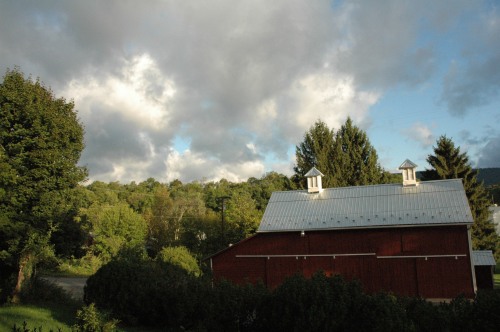Through the window of the room where I work, I see two red barns and beyond the barns the houses are facing the wrong way, away from the road and onto an empty grassy field.
Throughout the town there are half a dozen houses whose orientation has nothing to do with the roads but everything to do with the railroad that once ran through the town and then out along Sinking Creek on its way to Centre Hall.
You can still see, faintly in the grass, the marks of the rails in the yards between the houses. When this old house was young it looked down on the train station which was the heart of the town. In those days the town bustled with commerce, with dozens of small shops, farmers bringing their goods to the station and passengers loading for the trip into Bellefonte, the county seat. Dairy farmers shipped milk from this point to as far away as New York City. As late as 1950 the train still connected Spring Mills to the rest of the county and the country.
The romance of the railroads still lies like faint tracks across our national memory, from the days of the great westward expansion to the images of out-of-work men riding the rails during the Depression. I saw a man riding in an open boxcar once in the Rockies of Montana, the train running far below over a thin railroad bridge. The man’s legs dangled in space as the train hurtled over a white river. It was an image out of an earlier time when hard luck sent husbands and fathers out on the road or the rail looking for work.
I recall the time I went west by train, the little station in a small town in Virginia, shaking hands goodbye and loading my trunk into a baggage car, the long journey down the Eastern seaboard to Miami first to say goodbye to my brother and other relatives. There was no train to New Orleans, so I took a bus and my friend, Tim, met me at the station. Two days in New Orleans and Baton Rouge before I caught the train west to Oakland and San Francisco across the bay.
I talked to a man who had ridden the train through nearly every state of the nation, and sat with him talking in his compartment while the long empty plains of the Midwest flowed past like a dream. His only desire, he told me, was to have the time to ride all the trains again.
Every memory of trains I have, from the set of Lionel trains my father set up in the living room on a Christmas morning in Tennessee, to the Skunk Train that takes tourists through the old logging forests of northern California, to picking up our friend Nancy at the old Lewistown station when she comes in by train from New York, is filled with pleasure and a sense of participation in a shared event, of connectedness. Below the level of our consciousness the railroads run on tracks of memory and romance, like Thomas Wolfe’s mournful train whistle that opened up the world when he was a boy growing up in the hills of North Carolina.
Our desire for independence conflicts with our urge for connection. We want to be free to make our own schedules, to play the radio loud if we like. Yet each of us driving alone in our cars makes for the isolation of places as well as people, for an uncivil society and struggling communities.
The imagination runs on the steel wheels of the trains through the long countryside and into the small towns of a simpler, more connected America. I would give a lot to see the train pull into the station down the hill once again. This time it would be a clean, electric train, like the ones I rode each week from San Francisco to Berkeley. No smoke and coal dust blowing in through the windows, but a train nonetheless, carrying freight and passengers to the next small town and the distant cities.
